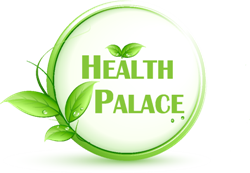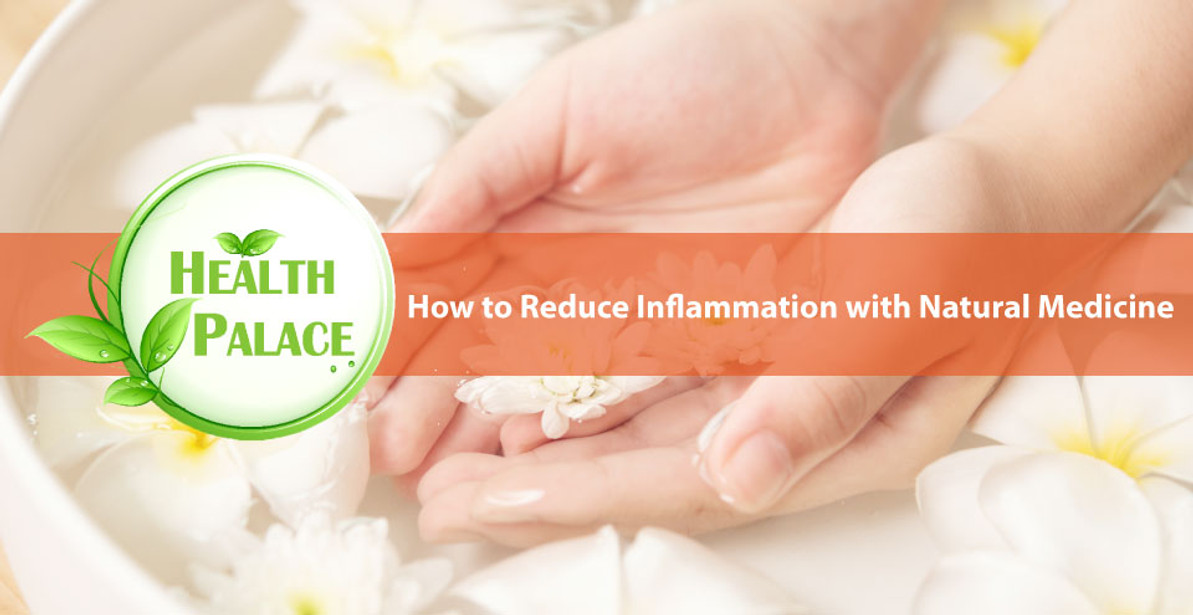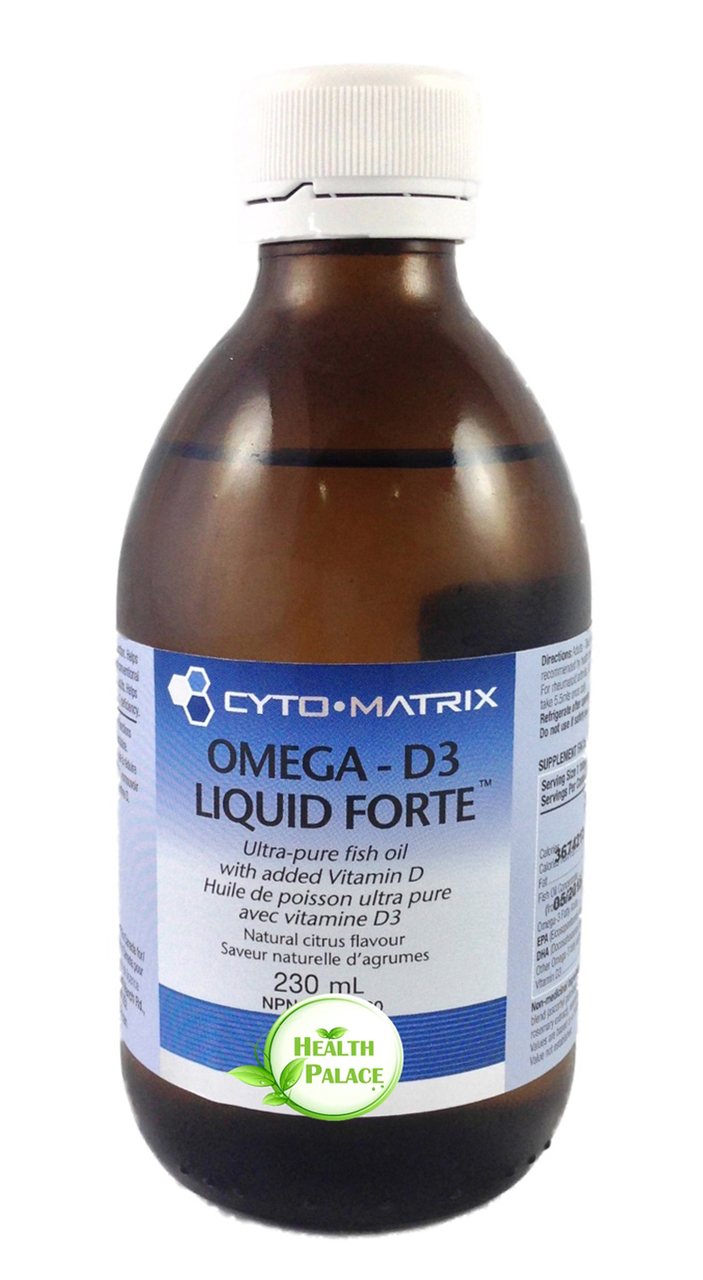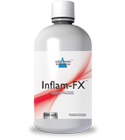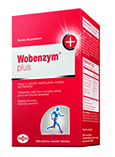How to Reduce Inflammation Effectively With Natural Medicine
How to Reduce Inflammation Effectively With Natural Medicine
Chronic inflammation is one of the top ten leading causes of mortality in the US. Chronic Inflammation is a major factor in developing degenerative diseases such as Heart disease, Stroke, Diabetes, Alzheimer's, Kidney disease, Cancer, etc. Chronic inflammation poses a great threat to our health without being noticed because its nature is gradual, silent, and destructive.
Inflammation manifests itself through the Acute and Chronic processes. A cute Inflammatory reaction is seen when the body is engaged with conditions such as an injury and infection. This response is rapid involving heat, redness, swelling, and pain. Quick treatment and controlling an acute inflammation will prevent further tissue damage and the spread of infection.
Chronic Inflammation occurs due to cellular stress. One of the main and necessary to life organelles inside each cell is called "mitochondria" producing energy (ATP) for each cell. When the mitochondrial function is disturbed, cell destruction will begin.
Mitochondrial dysfunction can be caused by different elements such as; frequent exposure to environmental toxins, aging, and those free radicals or toxins released during energy production.
Toxins damage the cellular structure initiating the process of either cellular death or cellular overgrowth. Aging also affects the efficacy of mitochondrial function by increasing free radical production.
Accumulated toxins in the mitochondria eventually leak out to the cell resulting in the cellular response to the toxicity and finally a compound named inflammasome is formed. This complex is activating the immune response to destroy the cell.
Mitochondrial dysfunction or rather intra-cellular toxins are not the only initiators of cellular death. High blood sugar including glucose and fructose, Uric Acid, LDL, and Homocysteine are some examples of immune system and inflammation triggering factors.
For instance, this is how excessive sugar causes cellular death: When extra and unused glucose or fructose is bound with lipids or proteins, a complex is created called Advanced Glycation End Products (AGEs). These compounds will attach to the surface of the cells signaling and turning on the inflammatory genes inside the cell's nucleus. Also, the more these genes are activated, the more they may mutate and cause malignancies.

Risk factors contributing to chronic inflammation are including:
Sleep disorders and sleep disruption leads to an increased amount of inflammatory markers in the blood. Elevation of these markers causes sleepiness and drowsiness during the day.
Both physical and emotional stress can increase the inflammatory markers in the blood. Stress along with sleep disturbances, high cortisol levels, and weight gain altogether or independently cause chronic inflammation.
Cigarette smoke contains several ingredients that increase the inflammation markers, and at the same time suppress the anti-inflammatory response of the body as well.
Obesity and increased body fatty tissues contribute to hormonal disturbances and metabolic changes. Fat tissues produce inflammatory markers and in an obese person, this production is as high as a serious inflammatory condition. Especially the visceral and abdominal fat cells can produce inflammatory markers up to three times higher than any other fatty tissues. This is one of the main causes of systemic inflammation and insulin resistance in an obese person.
Dietary Trans fat, sugar, and synthetic Trans fats especially in obese and/or diabetic individuals cause a significant increase in inflammatory markers.
An excessive amount of glucose not only causes mitochondrial disturbance but also does convert to triglycerides and fat-causing cardiovascular disease and stiffness of the arteries.
Older adults constantly show higher levels of the inflammatory markers in their blood even if they are healthy. The reason for this may be due to mitochondrial damage or the existence of other risk factors such as when there are changes in the body mass including accumulation of more fat, and loss of muscle mass, or when there is a reduction in male and female hormone.
There are multiple diseases associated with chronic inflammation. Cardiovascular disease caused mainly by elevated LDL triggering inflammatory responses in the inner layer of arteries. Scientists have established a direct link between chronic inflammation and cancer. about 25 % of the cancers are related to chronic inflammation resulting in malignant cellular mutations. Patients with Age-Related Macular Degeneration had a higher amount of inflammatory markers in the blood. Several studies have linked chronic inflammation to dementia and Alzheimer's. studies have found those with the higher inflammatory markers in their blood are 30-40 % more prone to develop dementia. Other diseases such as Arthritis, Colitis, Crohn's disease, fibromyalgia, Diabetes, Irritable Bowel Disease, and Gout all show high levels of inflammatory indicators.
Since in fact, the nature of the chronic inflammation is without any symptom until it damages the tissue, paying attention to the inflammatory markers, and taking a preventative approach is very important.
Nutritional solutions to reduce chronic inflammatory markers and prevent chronic inflammation:
Lower levels of vitamin D are associated with higher inflammatory markers. Also, it's been observed that patients with inflammatory diseases such as Systemic Lupus, Irritable Bowel Disease, and Rheumatoid Arthritis are more deficient in vitamin D.
In studies, supplementing with Vitamin E, especially when including both forms of Alpha-Tocopherol and Gama Tocopherol showed to be effectively able to reduce the inflammatory markers.
Selenium and Zinc both are antioxidants and able to reduce inflammatory markers and several inflammatory enzymes. Selenium and Zinc deficiencies are common in chronic inflammatory diseases.
Human trials are indicative of patients' improvements in different inflammatory diseases such as Rheumatoid Arthritis, IBD, and Psoriasis, when given bio-available Curcumin Supplement.

Polyphenol EGCG from tea in several studies has shown to be able to reduce inflammation markers, especially in patients with Coronary Heart Disease.
Standardized Boswellia Extract has provided effective results in reducing joint inflammation and pain in patients with Osteoarthritis. The function of Boswellia extract is improved when it was combined with Boswellia oil. Boswellia Extract is also seen to provide positive effects in the cases of asthma.
Studies demonstrated that Boswellia has effectively and significantly reduced inflammation associated with symptoms of cases with Ulcerative Colitis, Colitis, and Irritable Bowel Disease.
German researchers compared the effectiveness of an anti-inflammatory drug (Voltaren) to oral Bromelain supplementation in patients with Osteoarthritis pain. The results concluded that Bromelain was as effective as the drug in reducing pain, and stiffness, and improving mobility. Another study from England measured the improvement rate of the patients based on the dosage of Bromelain, concluding that the higher dosage was more effective in both pain and stiffness reduction of cases with acute joint pain.
Coenzyme Q10 and Pyrroloquinoline quinone (PQQ) are two great antioxidants with the ability to provide mitochondrial protection against cellular stress. Both of these powerful antioxidants protect and preserve the mitochondrial function against toxins and free radicals produced during energy production. Healthy mitochondria in turn can produce more energy and that positively improves the overall energy level in the individuals. Also, other studies have shown that in the inflammatory conditions levels of CQ10 are significantly lower than it is healthy conditions.
Let's not forget about the importance of blood sugar levels and their inflammation-producing effects. As was mentioned earlier, the end compounds from the Glycation process will turn on the inflammatory genes and induce cell death or mutation which is eventually causing tissue damage or malignancy. Tissue damages are often observed in diabetic cases, for example, diabetic neuropathy. The bio-available form of Thiamin (Vitamin B1) called Benfotiamine, based on several studies has shown great protecting effects against tissue-damaging in diabetics. Patients taking Benfotiamine in the proper recommended dosage found a reduction in neuropathic pain. Benfotiamine suppresses the Glycation; also, it regulates inflammatory enzymes. Amino Acid Carnosineis found to be able to control Glycation and reduce inflammation in diffident tissues such as the retina of the eyes. Carnosine concentration in muscular tissue declines by more than 50% by aging.

Other nutrients that can help with inflammation reduction in different tissues via different methods of action are; Magnesium, Trans-Resveratrol, Amino Acid NAC(N-Acetyl Cysteine), and Omega3 fatty acids, Fibre, and Carotenoids.
The conclusion is that inflammation itself is not a disease; but when it is not controlled and becomes chronic, it causes many different diseases. Lifestyle changes, maintaining a healthy balanced diet, losing the extra fat and weight, getting blood sugar and lipids under control, plus effective natural and nutritional medicines all together will reduce inflammation through their different yet unique abilities to control inflammatory markers.
Articles and products featured by Health Palace are collected from a variety of sources and are provided as a service by Health Palace. These newsletters, while of potential interest to readers, do not necessarily represent the opinions nor constitute the advice of Health Palace. Presented materials are only for information purposes and do not intend to treat, cure, or prevent any disease.
References:
- Aggarwal, B. B., Shishodia, S., Sandur, S. K., Pandey, M. K., and Sethi, G. Inflammation and cancer: how hot is the link? Biochem. Pharmacol. 2006;72(11):1605–1621
- Centers for Disease Control and Prevention. FASTSTATS - Leading Causes of Death. cdc.gov. 2011; Available at: http://www.cdc.gov/NCHS/fastats/Default.htm [Accessed December 23, 2011].
- Basta G, Schmidt AM, De Caterina R. Advanced glycation end products and vascular inflammation: implications for accelerated atherosclerosis in diabetes. Cardiovasc Res. 2004 Sep 1;63(4):582-92.
- Vgontzas, A. N., Zoumakis, M., Bixler, E. O., et al. Impaired nighttime sleep in healthy old versus young adults is associated with elevated plasma interleukin-6 and cortisol levels: physiologic and therapeutic implications. J Clin Endocrinol Metab. 2003;88(5):2087–2095
- Du, H., van der A, D. L., van Bakel, M. M. E., et al. Glycemic index and glycemic load in relation to food and nutrient intake and metabolic risk factors in a Dutch population. American Journal of Clinical Nutrition. 2008;87(3):655–661
- Bastard, J.-P., Maachi, M., Lagathu, C., et al. Recent advances in the relationship between obesity, inflammation, and insulin resistance. Eur. Cytokine Netw. 2006;17(1):4–12
- Dantzer, R. Depression and inflammation: an intricate relationship. Biol. Psychiatry. 2012;71(1):4–5
- Glorieux, G., Cohen, G., Jankowski, J., and Vanholder, R. Platelet/Leukocyte activation, inflammation, and uremia. Semin Dial. 2009;22(4):423–427
- Awad, A. B., Alappat, L., and Valerio, M. Vitamin d and metabolic syndrome risk factors: evidence and mechanisms. Crit Rev Food Sci Nutr. 2012;52(2):103–112
- Devaraj S, Leonard S, Traber MG, et al. Gamma-tocopherol supplementation alone and in combination with alpha-tocopherol alters biomarkers of oxidative stress and inflammation in subjects with metabolic syndrome. Free Radic Biol Med. 2008;44(6):1203-8.
- Jiang Q, Elson-Schwab I, Courtemanche C, Ames BN. gamma-tocopherol and its major metabolite, in contrast to alpha-tocopherol, inhibit cyclooxygenase activity in macrophages and epithelial cells. Proc Natl Acad Sci USA. 2000 Oct 10;97(21):11494-9.
- Bao, B., Prasad, A. S., Beck, F. W. J., et al. Zinc decreases C-reactive protein, lipid peroxidation, and inflammatory cytokines in elderly subjects: a potential implication of zinc as an atheroprotective agent. American Journal of Clinical Nutrition. 2010;91(6):1634–1641
- Duntas, L. H. Selenium and inflammation: underlying anti-inflammatory mechanisms. Horm. Metab. Res. 2009;41(6):443–447
- Bauerly K et al. Altering pyrroloquinoline quinone nutritional status modulates mitochondrial, lipid, and energy metabolism in rats. PLoS One. 2011;6(7):e21779. Epub 2011 Jul 21.
- Donnino MW et al. Coenzyme Q10 levels are low and may be associated with the inflammatory cascade in septic shock. Crit Care. 2011 Aug 9;15(4):R189.
- Bengmark, S. Curcumin, an atoxic antioxidant and natural NFkappaB, cyclooxygenase-2, lipooxygenase, and inducible nitric oxide synthase inhibitor: a shield against acute and chronic diseases. JPEN J Parenter Enteral Nutr. 2006;30(1):45–51
- Chainani-Wu, N. Safety and anti-inflammatory activity of curcumin: a component of turmeric (Curcuma longa). J Altern Complement Med. 2003;9(1):161–168
- Bahorun, T., Luximon-Ramma, A., Gunness, T. K., et al. Black tea reduces uric acid and C-reactive protein levels in humans susceptible to cardiovascular diseases. Toxicology. 2010;278(1):68–74
- Boswellia serrata. Altern Med Rev. 2008;13(2):165–167
- Gupta, I., Parihar, A., Malhotra, P., et al. Effects of Boswellia serrata gum resin in patients with ulcerative colitis. Eur. J. Med. Res. 1997;2(1):37–43
- Gupta, I., Parihar, A., Malhotra, P., et al. Effects of gum resin of Boswellia serrata in patients with chronic colitis. Planta Med. 2001;67(5):391–395
- Gayathri, B., Manjula, N., Vinaykumar, K. S., Lakshmi, B. S., and Balakrishnan, A. Pure compound from Boswellia serrata extract exhibits anti-inflammatory property in human PBMCs and mouse macrophages through inhibition of TNFalpha, IL-1beta, NO and MAP kinases. International Immunopharmacology. 2007;7(4):473–482
- Bromelain. Monograph. Altern Med Rev. 2010;15(4):361–368
- Walker AF, Bundy R, Hicks SM, Middleton RW. Bromelain reduces mild acute knee pain and improves well-being in a dose-dependent fashion in an open study of otherwise healthy adults. Phytomedicine. 2002 Dec;9(8):681-6.
- Akhtar NM, Naseer R, Farooqi AZ, Aziz W, Nazir M. Oral enzyme combination versus diclofenac in the treatment of osteoarthritis of the knee—a double-blind prospective randomized study. Clin Rheumatol. 2004 Oct;23(5):410-5
- Fitzhugh DJ et al. Bromelain treatment decreases neutrophil migration to sites of inflammation. Clin Immunol. 2008 Jul;128(1):66-74. Epub 2008 May 14.
- Stracke H et al. Benfotiamine in diabetic polyneuropathy (BENDIP): results of a randomised, double blind, placebo-controlled clinical study. Exp Clin Endocrinol Diabetes. 2008 Nov;116(10):600-5. Epub 2008 May 13.
- Shoeb M et al. Anti-inflammatory effects of benfotiamine are mediated through the regulation of the arachidonic acid pathway in macrophages. Free Radic Biol Med. 2012 Jan 1;52(1):182-90. Epub 2011 Oct 24.
- Boldyrev AA et al. [Carnosine: endogenous physiological corrector of antioxidative system activity]. Usp Fiziol Nauk. 2007 Jul-Sep;38(3):57-71.
- Fleisher-Berkovich S et al. Inhibitory effect of carnosine and N-acetyl carnosine on LPS-induced microglial oxidative stress and inflammation. Peptides. 2009 Jul;30(7):1306-12. Epub 2009 Apr 10.
- Vistoli G et al. Transforming dietary peptides in promising lead compounds: the case of bioavailable carnosine analogs. Amino Acids. 2012 Jan 28. [Epub ahead of print]
- Chacko, S., Song, Y., Nathan, L., and Tinker, L. Relations of dietary magnesium intake to biomarkers of inflammation and endothelial dysfunction in an ethnically diverse cohort of postmenopausal women. Diabetes. 2010;
- Araki, S., Dobashi, K., Kubo, K., Kawagoe, R., Yamamoto, Y., and Shirahata, A. N-acetylcysteine inhibits induction of nitric oxide synthase in 3T3-L1 adipocytes. J. UOEH. 2007;29(4):417–429
- Yuan, G., Wahlqvist, M. L., He, G., Yang, M., and Li, D. Natural products and anti-inflammatory activity. Asia Pac J Clin Nutr. 2006;15(2):143–152
Aor Boswellia 90 Liquid Capsules
|
Cyto Matrix Omega D3 Liquid Forte 230 ml | Alpha Science Inflam-FX 500 ml | ||||||
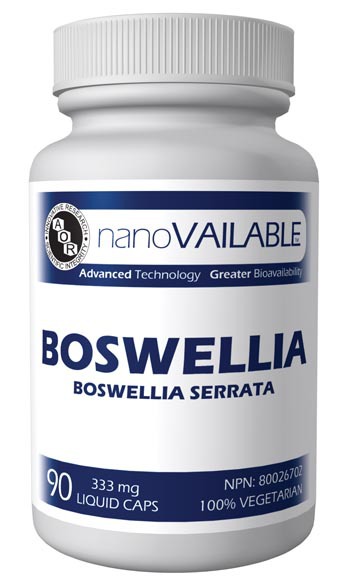
|
There is evidence to support the use in cardiovascular health, rheumatoid arthritis, etc. Vitamin D3 has long been known for reducing the risk of... Read more |
The primary action of this formula is to reduce chronic and acute pain and inflammation present in the musculoskeletal system... Read more |
||||||
|
|
|
|
||||||
|
|
|
|
||||||
Douglas Laboratories Infla guard 60 Tablets |
Douglas Laboratories Wobenzym Plus 240 Tablets |
Thorne MF Bromelain 60 Veg Capsules |
|
|
||||
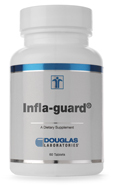
It contains a synergistic combination of three standardized botanical extracts: Boswellia serrata, turmeric root, and Devil’s Claw... Read more |
Wobenzym Plus can help support healthy joints and muscles, and support the immune system as well as normal wound healing processes... Read more |
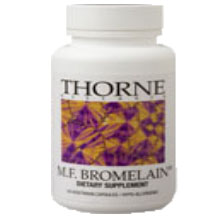
Bromelain has been shown to promote healing and reduce temporary and minor swelling and bruising following trauma or surgical procedures – including dental surgery... Read more |
Recent Posts
-
Macular degeneration
Macular degeneration which is commonly known as age-related macular degeneration (AMD /ARMD), is a m …7th Sep 2025 -
Maintain A Healthy Heart Rhythm With Integrative Medicine
Maintain A Healthy Heart Rhythm With Integrative Medicine;Usually, abnormal heart rate or arrhythmi …4th Feb 2021 -
How to Prevent Gallstones from Forming? | Natural Supplements for Gallstones
How To Prevent Gallstone Formation?Gallstones are hard deposits made of cholesterol or bilirubin f …4th Mar 2020
